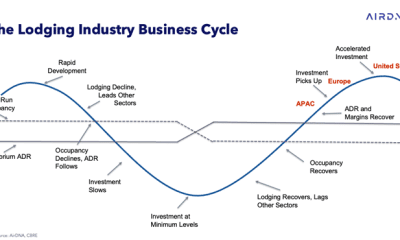
Voters on Nov. 8 soundly defeated two ballot initiatives that would have capped the number of short-term rentals and days of operation in Big Bear Lake, California, and banned all but host-occupied STRs in Portland, Maine. Meanwhile, almost all STR and lodging tax measures won voter approval on Election Night. New STR and lodging taxes, or increases in those tax rates, were concentrated in the states of California and Colorado.
Vacation rental ban defeated in Portland, Maine
Voters in Portland, Maine, voted down two ballot initiatives that would have restricted who could operate short-term rentals in the city.
Question A, drafted by a group of STR owners, would have banned corporations and non-local owners from operating short-term rentals in the city. The initiative also would have prohibited eviction of tenants for the purpose of converting a long-term rental into a short-term rental for a 12-month period and prevented the conversion of affordable and workforce housing into STRs. The ballot measure was defeated with 55.8% of votes.
Question B, proposed by the Democratic Socialists of America, would have limited STRs in Portland to owner- or tenant-occupied homes and two-unit buildings occupied by the owner. It was defeated with 55.4% of votes.
STR owners focused on campaigning against Question B because it would have effectively shut down vacation rentals on the city’s islands, many of which are second homes owned by mainland Portland residents who rent out the properties only when they’re not using them.
“I am grateful that Portland and island voters took the time to learn about Question B and to realize how devastating it would have been for Portland’s islands, and I am very grateful that mainland voters cast their votes in support of their island neighbors,” said Meghan Casey, a mainland Portland resident who owns a second home on Peaks Island.
Question A, on the other hand, allowed mainland residents to continue operating STRs on the city’s islands. Many of those island homes are not suitable for long-term rentals because the city shuts off water on some of the islands during the cold weather months of October to April, Casey said.
Casey was one of about 50 islanders from Peaks, Great Diamonds, and Little Diamonds who campaigned against Question B through face-to-face conversations with Portlanders, social media posts, letters to the editor, speaking to the press, and door hangers.
“Probably our most effective effort was talking to people. We spoke to islanders and mainlanders, explaining that Question B would devastate island economies and fundamentally change island communities that have existed for over a century,” she said.
Question B illustrated why STR ordinances crafted by citizen petitions are largely uninformed and ineffective, she said.
The Democratic Socialists of America drafted Question B with the intention of increasing the supply of long-term rentals to Portland residents.
However, DSA in its petition didn’t consider the fact that some of the Portland islands do not receive water from the city between October to April, therefore none of those homes can be converted into long-term rentals, Casey said.
She said she hopes that the City Council will work with STR operators, housing advocates, affected businesses, and neighbors to come up with STR regulation that is fair, fact-based, and effective.
“In any zoning law (which STR regulation is), there are dozens or hundreds of those details,” she said. “The City Council has a process for writing legislation that factors in all of those details. Let’s work with them.”
Big Bear Lake, California, voters reject VR cap
In Big Bear Lake, California, voters defeated a ballot measure that would have capped STR licenses to a total of 1,500, more than half of the town’s current stock of vacation rentals. Short-term rentals provide about two-thirds of lodging in the tourism-dependent town.
Measure O, voted down 57.57% to 42.43% as of Nov. 11, would have also limited the number of vacation rental contracts to 30 per year, excluding home-sharing arrangements.
The Vote No on Measure O campaign funded by Residents for a Better Big Bear focused on how the proposal would affect the small town’s economy. The measure would have reduced tourism spending by an estimated 40% and eliminated more than 2,000 jobs, according to the campaign.
Initially, opponents speaking out against Measure O were primarily STR owners and other businesses centered on tourism.
However, as word got out about how Measure O would affect employment, more and more workers joined the no campaign, prompting a change in campaign messaging to Save Our Jobs.
Christina Douglas, a property inspector at a more than 100-year-old cabin rental company called Big Bear Vacations, said she initially supported Measure O because she thought it would create more affordable housing in the area.
After learning more about the initiative, she said she realized that vacation rentals were too expensive to convert into affordable, workforce housing, and that Measure O would jeopardize her job, and she joined the opposition campaign.
During the campaign, she canvassed and participated in Save Our Jobs rallies with other tourism-dependent workers. Like many Big Bear Lake tourism workers, Douglas lives in the nearby town of Big Bear City due to more affordable housing options. As a result, she could not vote on Measure O but still would be affected by it.
“Even though I didn’t have a vote, I had to let p know how it was going to affect me and others,” she said.
Douglas’s message resonated with voters, said Tara Antongiorgi, an STR owner in Big Bear Lake.
“Our secret to success was focusing on how the measure would impact community members directly and not just property owners,” Antongiorgi said. “That’s what I believe, and that’s what the message was.”
Voters in Big Bear Lake did pass Measure P to increase the transient occupancy tax on hotel and vacation rental guests from 8% to 9% in January 2024 and then from 9% to 10% in January 2025.
That revenue will help support tourism in the community.
La Quinta, California vacation rental ban still undecided
Election officials on Nov. 11 were still counting the votes on a citizens’ petition in La Quinta in Southern California to ban all STRs not occupied by a homeowner in areas of the city that have been zoned as exempt for STRs. The restrictions would be phased in gradually through Dec. 31, 2024.
The Vote No on Measure A campaign was still hopeful about defeating the measure.
The city put a moratorium on STR permits in “non-exempt” residential areas in August 2020, reducing the number of STR units in non-exempt areas from 1,037 to 792, or 23.63%. Measure A would reduce the number of STRs in exempt areas from about 1,200 to 400. As a result, the city would lose an estimated $100 million in business sales, 445 jobs, $13 million in personal income, and between $6.1 million and $8 million in local tax revenue, according to City Attorney William Ihrk.
STR and lodging tax wave in Colorado
Voters approved STR tax referendums in several cities and counties around Colorado, stemming from a new state law, HB 22-1117, that allows lodging tax revenue to be used for affordable housing, child care, and other workforce development.
The exception was Centennial, Colorado, a small town in the Denver metropolitan area, and Grand Junction, Colorado, where voters rejected proposed taxes and tax increases.
Centennial, CO
Voters in Centennial defeated a 3.5% tax on short-term lodging, both STRs and hotels.
Centennial City Council Member Don Sheehan, who opposed putting the tax on the ballot, said concerns about an upcoming recession, the impact on business, and the lack of specificity on how the revenue would be used may have all played a role in voters’ rejection of the initiative. Some voters might also have experienced “ballot fatigue” by the time they reached the tax measure, as it was located at the very bottom of the ballot, Sheehan said.
Grand Junction, CO
Voters in Grand Junction overwhelmingly defeated Resolution 71-22, increasing the lodging tax by 1%, and Resolution 72-22 levying an 8% excise tax on STRs.
Summit County, CO
Voters in Summit County overwhelmingly approved Measure 1A levying a countywide STR lodging excise tax of 2%, effective Jan. 1.
In the town of Dillion in Summit County, voters passed additional layers of STR taxation, including a 2% increase in the lodging tax, a new STR-specific tax of 5%, and a measure to allow the town to increase its debt to fund workforce housing. All three measures take effect Jan. 1.
STR owners did not campaign against the increase in the lodging tax or the debt increase. However, they opposed the 5% tax in Dillion because it seemed excessive in light of the lodging tax increase and targets only STRs.
“I certainly support equitable and reasonable taxation to fund workforce housing projects across the county, so we can keep more of our local workforce in the community. I believe this is a goal our community shares and is aligned with,” said Toby Babich, president of the Summit Alliance of Vacation Rental Managers. “I do have a growing concern that the vacation rental industry, as part of the larger tourism servicing economy, is bearing a much larger burden of funding solutions than other industries.
“I have always had the philosophy that community problems require community solutions, and increasingly this financial burden is falling on one industry among many that benefit from tourism and vacation rentals. Equity is not something to implement only when it is convenient for everyone.”
The increased costs will fall to guests and are unlikely to harm demand for vacation rentals in the short-term.
“I am more concerned with the harm to other industries that will likely see reduced tourism spend as the cost of vacationing in Summit [County] continues to be inflated by government taxes and fees.”
Steamboat Springs, Colorado
Steamboat Springs voters said yes to Question 2A, a 9% tax on vacation rentals to generate funds for the construction of an affordable housing project in that city. The City Council recently created zoning maps to restrict where STRs are allowed in the city, and the STR tax is the final stage of that plan. The total taxes on STRs in Steamboat Springs is now 20.4%, one of the highest total taxes on STRs in Colorado.
The 9% tax is effective Jan. 1, does not apply to hotels, and will sunset in 20 years.
The Steamboat Springs Community Preservation Alliance (SSCPA) campaigned against Question 2A and proposed a more reasonable tax rate of 2%. STR operators said 9% was too high and would weaken Steamboat Springs’ competitiveness in attracting visitors and vital tourism revenue.
For example, taxes in Steamboat Springs will now be double that of Vail, one of Steamboat Springs’s competitors, Robin Creagen, vice president of SSCPA has said.
Aspen, Colorado
Aspen voters approved a sliding scale STR tax that penalizes the guests of STRs owned by investors or second homeowners. Guests at owner-occupied STR properties will be required to pay a 5% tax while guests at units owned by others will pay 10%. The tax takes effect May 1, 2023, and is estimated to generate about $9.14 million in the first year. At least 70% of the revenue will go toward the city’s housing program, while the other 30% can be used for other purposes, according to the Aspen Times.
There was no official campaign against the tax initiative.
Around the state
STR taxes were approved in the following cities in Colorado and take effect Jan. 1:
- Carbondale, CO – 6% excise tax on STR stays to support affordable housing projects.
- Dolores County, CO – 2% lodging tax on hotels, STRs, and other transient lodging providers to help fund tourism marketing, child care, and affordable housing.
- Eagle County, CO – 2% lodging tax in towns and unincorporated areas where a lodging tax didn’t already exist. The tax would apply to the town of Gypsum and unincorporated areas of Eagle County, including Beaver Creek and Bachelor Gulch. Vail and other cities in Eagle County already have lodging taxes in place and are not subject to the county tax.
- Estes Park, Larimer County, CO – 3.5% lodging tax on STRs and other transient lodging providers to go toward solving workforce shortage issues such as child care and housing.
- Georgetown, CO – Measure 2A proposes changing the 2% county lodging tax with a 2% town sales tax on lodging to go toward “Tourism, Marketing and Events in addition to providing funding to workforce housing programs, and childcare for residents employed in tourism supported businesses.”
- Gilpin County, CO – 2% lodging tax on STRs, hotels, and other short-term lodging
- Littleton, CO – 5% lodging tax on guests who stay at STRs, hotels, and other transient lodging providers
- Salida City, CO – flat rate STR tax, including a $1,000 annual fee on STR license holders and an occupational lodging tax of up to a maximum of $15 per bedroom per night. Both revenue streams would go toward affordable housing.
Lodging Taxes in California
In California, voters approved increases in transient occupancy taxes specifically for STR guests in Santa Monica and Santa Cruz. Hotel, motel, and inn guests will pay a lower fee.
- Santa Monica – The TOT rate increased from 14% to 15% on hotels and from 14% to 17% on short-term rentals.
- Santa Cruz – The TOT increased from 11% to 12% for hotels, motels, and inns and increased to 14% for STRs.
- Inyo County – Voters rejected Measure Q to expand the county hotel tax to include STRs at a rate of 12% of the rate charged.













RSS